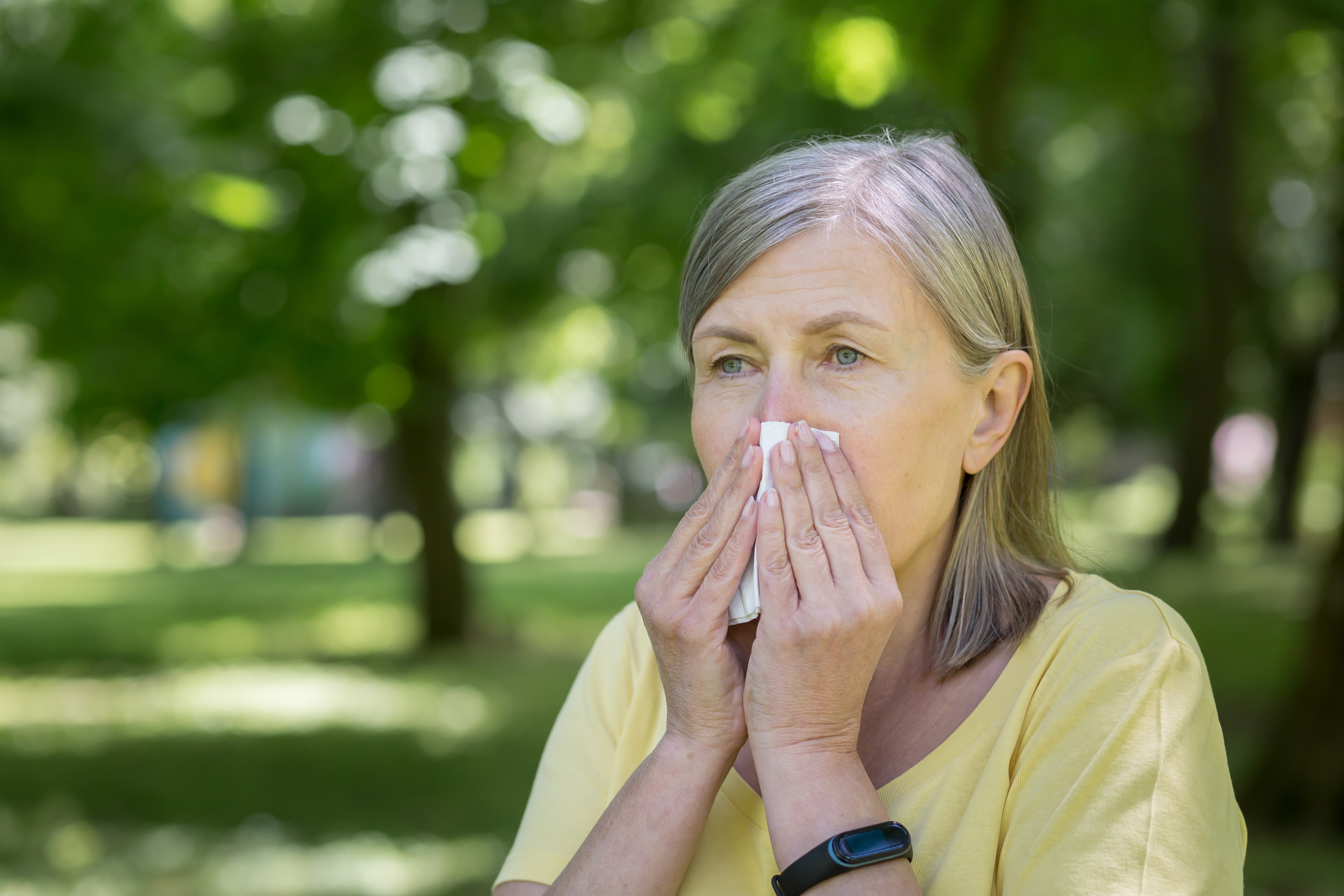November 25, 2023
Understanding Allergies in Seniors: A Comprehensive Guide for 55+ – Part 2

Safe and Effective Allergy Treatments for the 55+ Age Group
When it comes to treating allergies in those aged 55 and above, special considerations are required to ensure both safety and effectiveness. This age group often deals with multiple health issues and may be more sensitive to certain medications due to age-related changes in metabolism and organ function.
Overview of Antihistamines, Corticosteroids, and Decongestants
Antihistamines: These are the cornerstone of allergy treatment and work by blocking the effects of histamine, a chemical released during an allergic reaction. Older adults should ideally use second-generation antihistamines (like cetirizine, loratadine, or fexofenadine) as they are less likely to cause drowsiness and cognitive impairment compared to first-generation antihistamines.
Corticosteroids: Nasal corticosteroids are effective for treating allergic rhinitis. They reduce inflammation and are generally safe for long-term use in older adults, though regular monitoring for potential side effects like nasal dryness or irritation is advisable.
Decongestants: These can provide quick relief from nasal stuffiness but should be used with caution in the senior population. Oral decongestants like pseudoephedrine can increase blood pressure and may not be suitable for those with heart conditions or hypertension.
Side Effects and Considerations Specific to Seniors:
Side Effects: The elderly are more prone to side effects like dry mouth, urinary retention, and drowsiness. They also have a higher risk of drug interactions.
Non-drowsy Formulas and Geriatric Doses: It’s crucial to opt for non-drowsy formulas in antihistamines to avoid sedation and risk of falls. Reduced dosing, or geriatric doses, may also be necessary to minimize side effects.
Immunotherapy
Benefits for Older Adults: Allergen immunotherapy, commonly known as allergy shots, can be beneficial for older adults. It can reduce the severity of symptoms over time and minimize the dependence on medications.
Precautions and Effectiveness: While effective, immunotherapy in seniors requires careful consideration. Pre-existing medical conditions and the risk of anaphylaxis need to be weighed. However, with proper monitoring and a gradual increase in allergen exposure, immunotherapy can be both safe and effective for the elderly.
Natural Remedies and Lifestyle Changes
Diet: A healthy, balanced diet can bolster the immune system. Some foods have natural antihistamine properties, such as quercetin found in onions and apples, and can be beneficial in managing allergy symptoms.
Air Purifiers: Using air purifiers with HEPA filters can help reduce indoor allergens like dust mites, pet dander, and pollen.
Allergen-free Home Environment Tips
- Keep windows closed during high pollen seasons and use air conditioning in the home and car.
- Regularly wash bedding in hot water to kill dust mites.
- Use dust mite-proof covers on mattresses and pillows.
- Minimize indoor humidity to below 50% to deter mold growth.
- Remove or reduce indoor plants if mold allergies are present.
- Regularly clean and vacuum, preferably with a vacuum cleaner that has a HEPA filter, to reduce household dust and pet dander.
Managing Chronic Conditions Alongside Allergies
For individuals over the age of 55, managing allergies often means dealing with them in the context of other chronic conditions. The interplay between allergies and coexisting health issues, along with the complexities introduced by multiple medications, necessitates a thoughtful, holistic approach to treatment and management.

Allergies and Coexisting Conditions
Here are a few examples of how allergies can exacerbate conditions like Asthma, Sinusitis, or Eczema:
Asthma: Allergens like pollen, pet dander, or dust mites can trigger asthma attacks in those who have both conditions. This can make asthma symptoms more frequent and severe.
Sinusitis: Allergic rhinitis can lead to inflammation and congestion in the nasal passages, exacerbating sinusitis symptoms and potentially leading to more frequent or prolonged sinus infections.
Eczema: Allergens in the environment can aggravate eczema, leading to more severe itching and flare-ups. This can disrupt sleep and reduce the quality of life.
The Holistic Approach to Managing Multiple Health Issues
A holistic approach considers not just the allergies but the entire spectrum of an individual’s health. This includes understanding how different conditions interact and ensuring that the treatment for one does not worsen another.
Lifestyle modifications, dietary changes, and stress reduction techniques can play a vital role in managing these interconnected health issues holistically.
Regular monitoring and adjustments in treatment plans, as necessary, are crucial when dealing with multiple chronic conditions.
Interaction with Medications
Seniors often take multiple medications for various chronic conditions, raising the risk of potential drug interactions. For example, certain blood pressure medications can worsen allergy symptoms or interfere with allergy medications.
Over-the-counter (OTC) allergy medications, such as decongestants, can increase blood pressure and may be contraindicated in those with hypertension or heart disease.
Working with Healthcare Providers to Ensure Safe Treatment Plans
It’s essential for seniors and their caregivers to maintain open communication with healthcare providers about all the medications being taken, including OTC drugs, prescriptions, and supplements.
Healthcare providers can help in identifying potential drug interactions and can suggest alternative medications or treatments.
Periodic reviews of all medications by a healthcare provider or a pharmacist can help in optimizing treatment plans, ensuring both safety and efficacy.
The Role of Technology in Managing Allergies for Seniors
In the digital age, technology plays an increasingly pivotal role in healthcare, especially for seniors managing chronic conditions like allergies. The integration of telehealth, digital consultations, apps, and trackers has not only made healthcare more accessible but also more tailored and responsive to individual needs.

Telehealth and Digital Consultations
Mechanism: Telehealth services allow seniors to consult with healthcare providers via video calls, phone calls, or messaging. These platforms enable patients to discuss symptoms, receive diagnoses, and get prescriptions without leaving their homes.
Benefits: For seniors, particularly those with mobility issues or those living in remote areas, telehealth can be a game-changer. It reduces the need for transportation and minimizes exposure to other potentially harmful allergens or illnesses present in clinical settings. Furthermore, telehealth is invaluable for regular monitoring and follow-ups, essential for managing chronic conditions like allergies.
Stories or Case Studies:
Consider a case study of a senior patient living in a rural area, far from an allergy specialist. Through telehealth, they could receive a diagnosis of their allergy symptoms, get prescribed medication, and have regular follow-up consultations to adjust their treatment plan — all without the need for lengthy, potentially difficult trips to a specialist.
Another example could be a senior with mobility challenges. Telehealth enables them to have regular consultations to manage their seasonal allergies, ensuring timely adjustments to their treatment as the seasons change, thus maintaining a good quality of life.
Apps and Digital Trackers
Functionality: Many smartphone apps and digital trackers are designed to help seniors monitor their allergy symptoms and medication schedules. These tools can track symptom patterns, medication usage, and even alert users about high pollen counts or changes in air quality in their area.
Advantages: This real-time tracking assists in identifying specific allergy triggers and understanding the effectiveness of prescribed medications. Furthermore, medication reminder features help in ensuring adherence to treatment plans, a common challenge among the elderly due to complex medication schedules.
User-friendly Technology for Seniors
Given that some seniors might not be as tech-savvy as younger generations, it’s essential that these apps and trackers are user-friendly, with simple interfaces and clear instructions.
Voice-assisted technology can be particularly helpful, allowing seniors to interact with apps through voice commands, reducing the need to navigate through complex menus or type on small screens.
The design of these technologies often includes larger text, easy-to-read color contrasts, and straightforward navigation paths to accommodate vision and motor skill changes in the elderly.
Lifestyle Considerations: Diet and Exercise
Managing allergies in the 55+ age group isn’t just about avoiding triggers and taking medication. Lifestyle choices, particularly regarding diet and exercise, play a significant role in controlling symptoms and improving overall well-being. This section explores how an allergy-friendly diet and a thoughtful exercise regime can contribute positively to managing allergies in seniors.
Allergy-Friendly Nutrition
Identifying Individual Triggers: Seniors with food allergies need to be particularly cautious about avoiding specific triggers. Common allergenic foods include nuts, shellfish, dairy, and eggs. Keeping a food diary can help identify potential food allergies or intolerances.
Reading Labels: Always read food labels for potential hidden allergens. This is especially important for processed foods, which can contain unexpected ingredients.
Anti-inflammatory Diets
Benefits: An anti-inflammatory diet can help manage not just allergies, but also other chronic conditions prevalent in seniors, such as arthritis and heart disease.
Key Components: Focus on foods rich in omega-3 fatty acids, antioxidants, and fiber. This includes fatty fish (like salmon and mackerel), nuts and seeds, fruits and vegetables (especially leafy greens), and whole grains.
Spices and Herbs: Turmeric, ginger, and garlic, known for their anti-inflammatory properties, can be included in daily cooking to add both flavor and health benefits.
Staying Active

Timing Matters: For those with seasonal allergies, the time of day can impact how strongly one reacts to outdoor allergens. Pollen counts are typically higher in the early morning and on warm, windy days, so choosing to exercise later in the day can be more comfortable.
Protective Gear: Wearing sunglasses to protect eyes from pollen, and a mask if pollen counts are high, can help reduce symptoms.
Indoor Exercises for Allergy Sufferers
Home Workouts: Engaging in home-based exercises like yoga, Pilates, or even simple stretching and strength-training exercises can be beneficial. These activities improve flexibility, strength, and balance, reducing the risk of falls while keeping the body active.
Gym Workouts: For those preferring a more structured exercise environment, gym workouts can be an excellent option. They offer the advantage of exercising in a controlled environment, away from outdoor allergens.
Swimming: Swimming in an indoor pool can be particularly good for seniors, as it’s low impact and the warm, humid environment can help with breathing and soothe airways aggravated by allergies.
Conclusion
Dealing with allergies post-55 can seem daunting, but with the right knowledge and tools, it’s entirely manageable. Recognizing and effectively treating allergies requires a careful, nuanced approach. Awareness of how allergy symptoms can present differently in older adults, and how these symptoms overlap with other age-related conditions, is key to ensuring that seniors receive appropriate and timely care. By staying vigilant and consulting with healthcare professionals, seniors can manage allergies effectively, leading to a better quality of life.